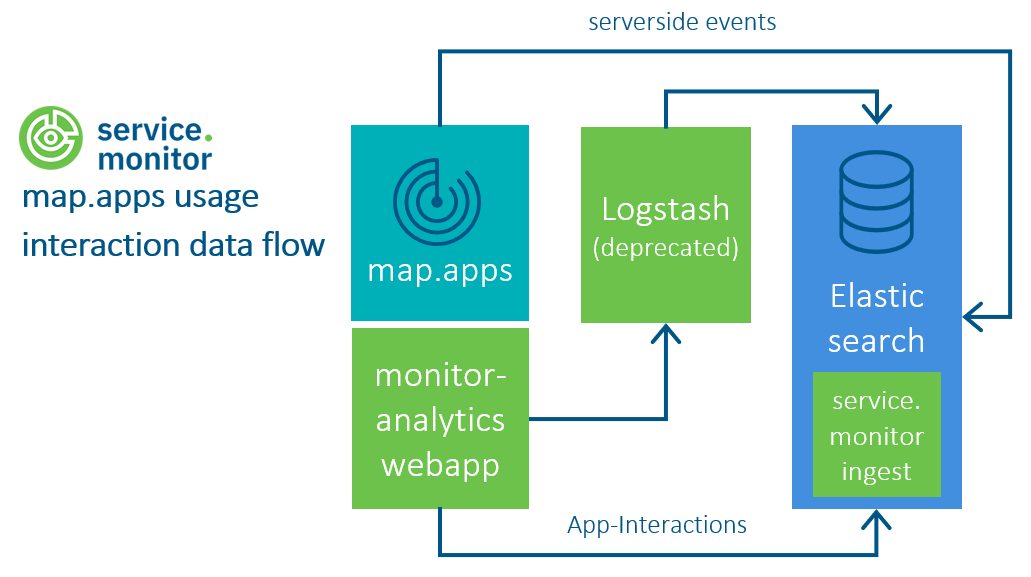map.apps user interaction
Overview

The map.apps user interactions can be captured via ingest pipeline ct-monitor-analytics. It is able to normalize and pseudonymize the user interactions before they are stored in Elasticsearch.
Procedure
-
Configuring the ingest pipeline
ct-analytics(see Elastic Ingest Pipeline) -
Uploading the analytics bundles to map.apps Manager
-
Configuration of map.apps
Upload Analytics Bundles
To use the bundles of service.monitor, install them in map.apps.
-
Login to the map.apps Manager as Admin user.
-
Go to the Bundles tab.
-
Click + Upload and select
ct-monitor-analytics-js-[VERSION].jar.
service.monitor’s Analytics bundles are now displayed in the list of installed bundles. -
Refresh the map.apps Manager to see the Analytics tab.
Configuration of map.apps
You can use service.monitor to collect and display usage data of a map.apps installation.
Change or add the below properties in the map.apps application.properties file to integrate service.monitor in map.apps.
Afterwards, restart the Servlet Container or reload the context.
The path of the map.apps data.directory.location is different than the one of service.monitor.
|
#### service.monitor Integration
analytics.service.url=/monitor-analytics/resources/usage/log
analytics.message.src=map.apps
appservice.default.bundles=analytics_restservice
servicemonitor.base.url=/monitor
analytics.management.role=maAdminanalytics.service.url-
HTTP endpoint for collecting usage data by means of service.monitor webapp.
Property status: new
Default:https://analytics-host.example.com/monitor-analytics/resources/usage/log analytics.message.src-
Name of the message’s source (for analyses purposes).
Property status: new
Default:map.apps appservice.default.bundles-
Bundles, that are loaded for each app.
If you add the
analytics_restservicebundle to the property, all apps will send the collected data to theanalytics.service.urlby default. This happens even if theanalytics_restservicebundle is not listed in theallowedBundlessection of an app, simplifying the one-time activation of service.monitor for all apps.When editing and saving an app via Live-Configuration in map.apps the bundles mentioned above will be added to the
app.jsonfile. This change remains even if bundles are removed from theappservice.defaultbundleslist again.This property applies only to apps provided via the map.apps app service and not to apps stored in the file system.
Property status:
may already pre-exist
Default:analytics_restservice(since map.apps 4.16)Default:
system,templatelayout,analytics_restservice servicemonitor.base.url-
HTTP endpoint for embedding
/monitorwebapp as part of map.apps Management view.Property status: new
Default:https://monitoring-host.example.com/monitor analytics.management.role-
Name of role that is required to view
/monitorwebapp in map.apps ManagerProperty status: new
Default:maAdmin
If the map.apps is not running on the same as the service.monitor monitor-analytics-webapp, add the host to the allowedProxyUrls in the map.apps application.properties file.
|
Enable logging by app
To enable logging for an app, add one bundle with writer component (e.g. analytics_restservice) to the allowedBundles section in the app.json.
To enable logging for all apps instead, see appservice.default.bundles.
{
"load": {
"allowedBundles": [
...
"analytics_restservice"
]
}
...
}